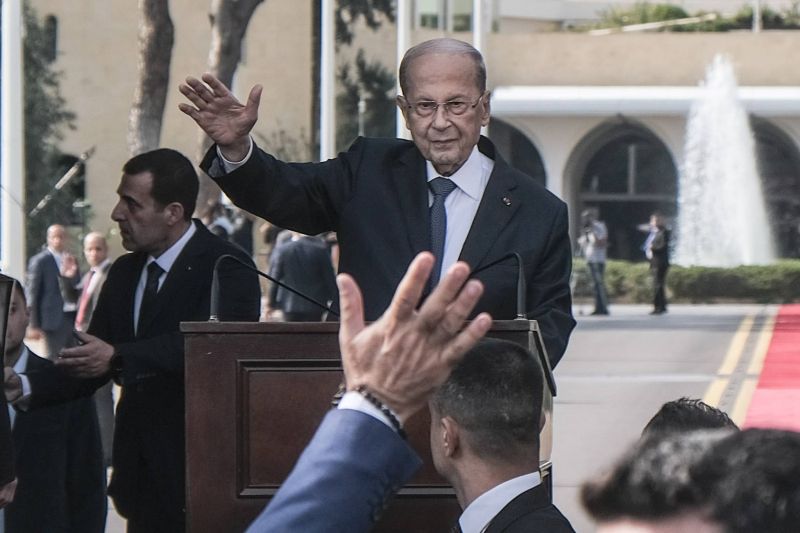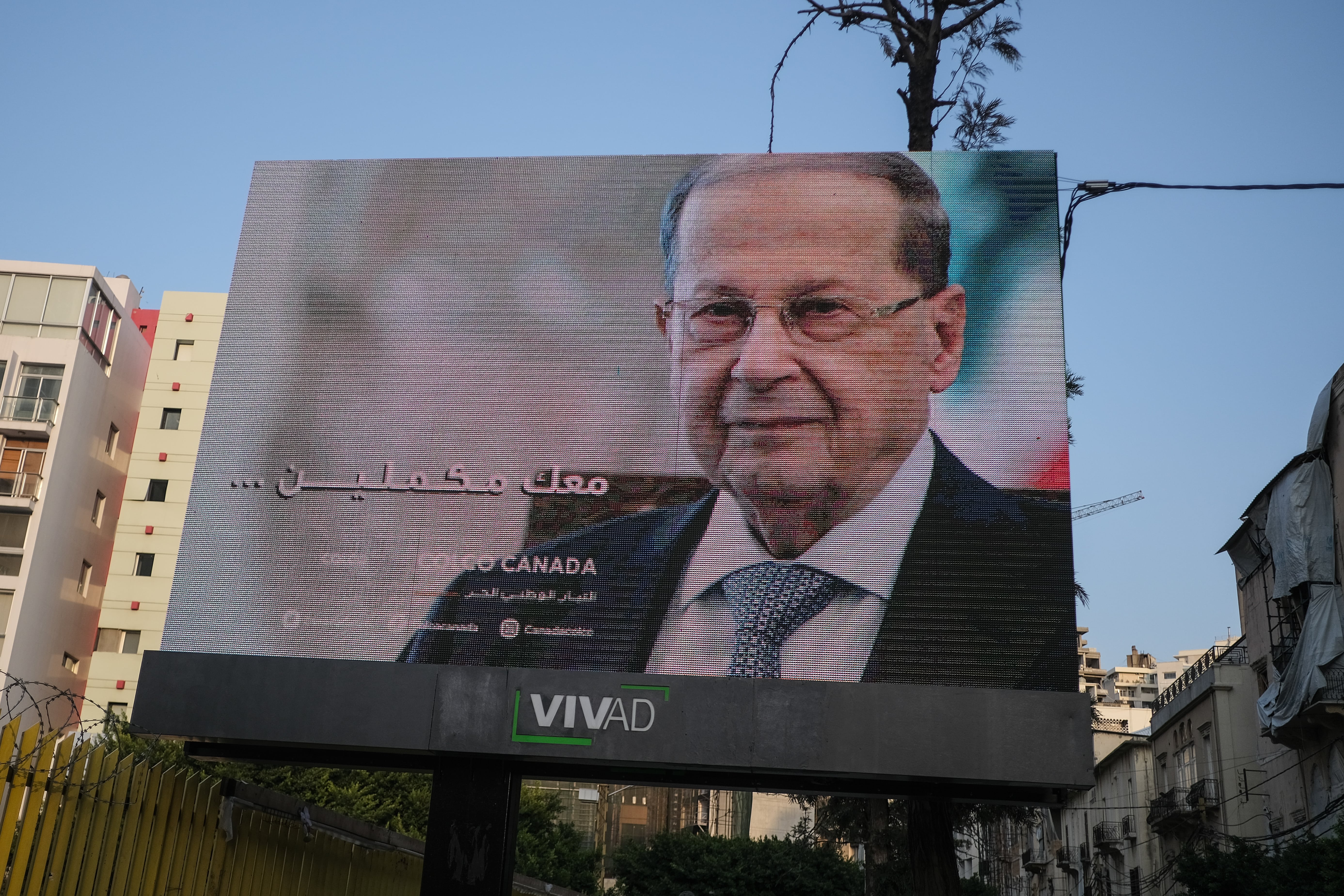
A ceremony marking Michel Aoun's last day as president, Oct. 31, 2022. (Credit: João Sousa/L'Orient Today/File photo)
For the research-obsessive among you, click here for our detailed play-by-play of each recent voting session.
A year ago today, Michel Aoun vacated the Baabda Presidential Palace on the last day of his term. Workers later closed the doors to the Presidential wing, lowered the Lebanese flag and took down Aoun’s official portraits.
After 12 voting rounds, endless diatribes, countless meetings, as well as local and international attempts at mediation, the palace remains empty.
Meanwhile, there’s also no fully empowered cabinet – and therefore no fully empowered prime minister – since they went into caretaker status following legislative elections in May 2022, leaving Lebanon in a dual executive vacuum.
With no date for a 13th election session in sight, we look back at Lebanon’s year without a president.
How does a president get elected, anyway?
The election period begins two months before the end of a sitting president’s term. At this point, Parliament convenes for presidential election sessions to carry out the vote.
There are two rounds of voting in each session. In the first round, a candidate needs two-thirds of votes (86 out of 128 MPs) in order to win. If nobody wins in the first round, a candidate needs only a simple majority of 65 votes in order to win the second round.
So far, Parliament has failed to reach a second round of voting as it has consistently lost quorum (two-thirds of MPs) after each first round due to MPs exiting the session.
Several parties argue that once Parliament begins its attempts to elect a president, it can only act as an electoral college — meaning it cannot legislate or hold any sessions other than those aimed at voting for the president. This has led to boycotts of several legislative sessions.
While this is the first time Lebanon faces a dual executive vacuum, given the cabinet’s caretaker status, there’s been at least four noteworthy presidential vacancies in Lebanon’s history.
The record for the longest time the Lebanese state remained headless: 890 days.
 A billboard in Beirut bidding former President Michel Aoun farewell, Oct. 31, 2022. (Credit: João Sousa/L'Orient Today/File photo)
A billboard in Beirut bidding former President Michel Aoun farewell, Oct. 31, 2022. (Credit: João Sousa/L'Orient Today/File photo)
Who’s in the running?
Lebanon’s president is conventionally a Maronite Christian, however, some exceptions have been recorded.
Also, candidates don’t necessarily need to announce themselves officially in order to be in the running – in the end, Parliament members can in theory cast ballots for whomever they want, whether they have announced their candidacy or not.
Here are the main contenders so far:
Independent Zgharta MP Michel Moawad: Michel is the son of former President René Moawad who was assassinated in 1989, 17 days after his election. He heads the Renewal parliamentary bloc. Moawad, however, has withdrawn from the race.
Marada Movement head Sleiman Frangieh: Amal and Hezbollah view Frangieh as a “non-confrontational” figure who aligns with their interests. Additionally, he has close ties with Syrian President Bashar al-Assad, a longtime ally of Hezbollah.
IMF official Jihad Azour: a former minister and director of the IMF’s Department for the Middle East and Central Asia, is said to be aligned with the March 14 camp, which opposes Hezbollah and Amal.
Issam Khalifeh: An advocate for secularizing the state, society and education system, and in recent years an advocate of Line 29 as Lebanon’s maritime border with Israel, which would have added 1,430 square kilometers to Lebanon’s territorial waters.
Lebanese Army chief Gen. Joseph Aoun: Aoun has said he is not interested in the presidency. His election requires a constitutional amendment due to his army position, which is being vetoed by Parliament Speaker Nabih Berri. Free Patriotic Movement (FPM) leader Gebran Bassil also opposes Aoun’s candidacy, allegedly viewing him as a threat to his influence within the FPM circles.
In short:
Parliament held its first presidential election session on Sept. 29, 2022, nearly a month before Aoun’s term ended. No successor was chosen during any of the four sessions before Aoun left Baabda.
The outcome of the first session would match the next nine attempts to end the vacancy.
Independent Zgharta MP Michel Moawad, backed by the Lebanese Forces (LF), the Kataeb and their allies, faced a slew of blank ballots, cast by Hezbollah, the Amal Movement and the FPM. The remainder of the ballots included political slogans or write-ins for unlikely candidates. The lead shifted between Moawad and the blank ballots, while neither reached the coveted 86 votes in the first round.
Nearly six months after the 10th round of voting in January, the 11th session pitted International Monetary Fund official Jihad Azour — backed by the FPM, the LF, the Kataeb, Forces of Change MPs and independents following Moawad’s withdrawal — against Marada Movement leader Sleiman Frangieh, backed by Hezbollah and Amal. The session was inconclusive and no date for a 13th session has been set.
Over the past 12 months, repeated calls by the international community, threats of sanctions, visits by foreign diplomats, interruptions to Parliament and cabinet’s functioning as well as to official appointments have done little to help achieve a breakthrough.
For the research-obsessive among you, click here for our detailed play-by-play of each recent voting session.